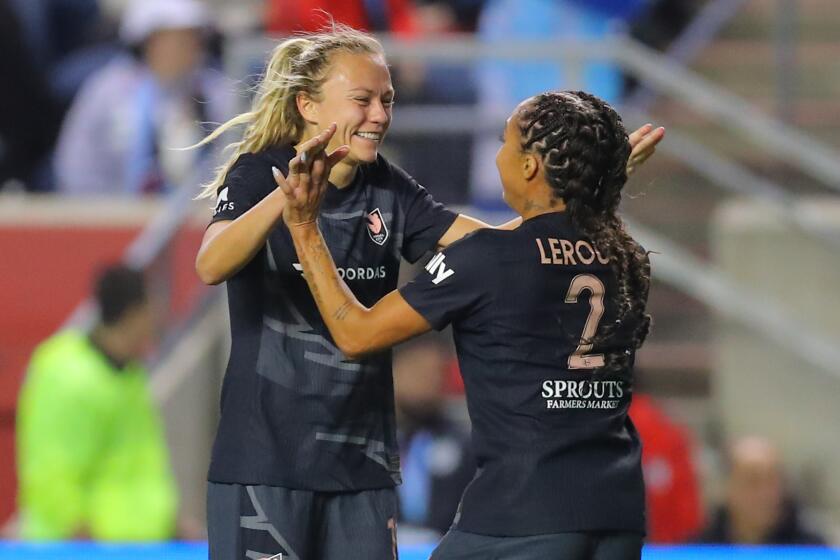Where’s Tiffeny?
She scored the goal that won the gold medal for the U.S. women’s soccer team in Atlanta.
She was the leading American scorer at the magical women’s World Cup in 1999, as well as at the 2000 Olympics in Sydney.
For several years, she was by far the most dangerous offensive weapon in the world of women’s soccer -- more intimidating and productive for a while than even Mia Hamm, who kept getting the awards and the attention.
She is opinionated, energetic and a bit of a rebel, but in a way that has endeared her to teammates and fans. Maybe all of America didn’t know her name, but the young girls who screamed for her autograph sure did.
Now it’s 2004 and another Olympics is approaching, but Tiffeny Milbrett is sitting this one out. The player who craves creativity and freedom on the field and off has decided she can no longer play for Coach April Heinrichs.
“I’m an adult. I’m 31 years old,” Milbrett said in an interview from her home in Portland, Ore. “I’ve played maybe a 1,000 more games in the modern era of the women’s game than April has, and I feel like there’s things that need to happen in order to facilitate an environment for professional women soccer players.
“If that environment isn’t going to be professional and if that environment isn’t going to allow me to be the player that I am, then it’s not worth it. Soccer’s not a game that you can restrict players, especially creative players and players who have proven themselves at that level.”
Those are searing words, especially from a key member of a team generally portrayed as one big happy family. But no one should expect less from the outspoken Milbrett, who once yelled back at anti-American protesters in Australia and had to be dragged away by teammate Brandi Chastain.
“I miss her at lot,” Chastain said this month before an Olympic tuneup game against Japan. “I miss the diversity that she brings to this team. We are all very unique and very quirky in our own ways, but her humor and her straightforwardness, I think we miss that. I hope that she comes back.”
Milbrett informed Heinrichs of her decision last fall, after the U.S. team finished a disappointing third at the World Cup. Milbrett, who can freelance with the ball as well as anyone, felt stifled in Heinrichs’ structured game plans and cramped schedule of team dinners, meetings and video sessions.
“I wish Tiffeny Milbrett well,” said Heinrichs, who said she preferred not to discuss the specifics of Milbrett’s departure. “There’s no ill feelings on my part, and my focus is going to be to keep this team focused on the task at hand and stay committed to the players that are interested [in playing] for us and playing within the team construct, and there’s a lot of those players in America right now.”
Milbrett has been on what she calls a sabbatical. She’s enjoying some time at home with her family after a decade of never-ending plane flights and hotels. She’s had time to grieve over the death of her mentor, Clive Charles, who encouraged her creativity as her coach at the University of Portland. Charles died in August after a long battle with prostate cancer.
Milbrett also discovered that the year-old ache in her knee was actually a cartilage injury, so she had surgery in March. Still recovering, she pulled out of this weekend’s WUSA festival in Blaine, Minn.
Milbrett sounds relaxed and content as she speaks, but Athens is now less than two months away. She also has 99 career goals, one short of the rare century mark players covet. Surely there must be a nagging feeling that she ought to be with her teammates.
“It’s not like you make a decision and everything inside you is 100 percent happy,” she said. “I think it’s sad to me that I had to make a decision to not play the game that I feel like I’m best at and that I love. But if it was just about the game itself, I’d be there in a heartbeat. But that’s not how the real world works.”
There are many reverberations to Milbrett’s decision. The U.S. team will go to Athens without one of its best players. Although the team is deep in forwards, Milbrett is the first player virtually anyone would choose to have on the field to score a tough goal in a clutch situation.
Milbrett’s departure also adds to the pressure on Heinrichs, who is 0-for-2 in major world tournaments since replacing Tony DiCicco in 2000. Heinrichs is a victim of the ridiculously high expectations placed on the U.S. team, but there’s also a feeling that she needs to bring home the gold this time.
Milbrett’s self-exile has been a remarkably quiet one. If Hamm, Chastain or Julie Foudy had done the same, the public outcry would have been hard to ignore.
But Milbrett has rarely been given her due. Perhaps it’s because she’s not as glamorous as some of her teammates, or perhaps it’s because her candor rubs some people the wrong way, or perhaps it’s because she wasn’t part of the University of North Carolina clique that produced Heinrichs and many other U.S. stars.
“There are certain things that have happened during the years that have made me feel that doubt that I am a good player -- or that good of a player,” Milbrett said. “There’s many times that I’ve not been thought of as highly as other players, and do I know why? No. I don’t know why. I couldn’t change who I am; I couldn’t change the kind of player I am.”
Milbrett said she might play overseas if WUSA doesn’t return next year, but it’s hard to imagine her returning to the national team under Heinrichs.






